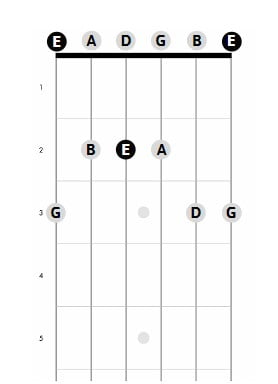The E minor pentatonic scale is a popular scale among guitarists across various music genres. This scale is a shorter version of the E minor scale, with two notes removed. As it consists of only five notes, it is called a pentatonic scale. Many famous rock, metal, and blues songs use the E minor pentatonic scale, such as “Purple Haze” by Jimi Hendrix. Stevie Ray Vaughan, a blues-rock guitar virtuoso, also used this scale in his compositions. Learning this scale is beneficial for beginners and experienced guitarists as it covers the entire fretboard, allowing greater versatility and dexterity. Let’s explore the notes that make up the E minor pentatonic scale and how to play it.
Contents
Notes on the E minor pentatonic scale
The E minor pentatonic scale is composed of five notes, which are repeated in higher or lower octaves as you move your fingers across the fretboard. These notes are
• E • G • A • B • D
The formula for the minor pentatonic scale includes the first note of the standard E minor scale, a flattened third, the fourth note, fifth note, and flattened seventh note.
• 1 • b3 • 4 • 5 • b7
To play this five-note pattern in the E minor pentatonic scale, you start from low E to high e to complete a full series of notes. It’s worth noting that the notes E, G, and B also form the E minor triad chord.
E minor pentatonic scale position
There are several ways to play the E minor pentatonic scale on the guitar. In this lesson, we’ll explore how to play it in the open position using a scale chart. Playing in the open position involves using only the first three frets of your guitar. To learn how to play the scale, we’ll use charts that represent the neck of your guitar. These diagrams show you which note to play on a specific fret and string. If you see a dot with a note above the string, you should play the string in an open position. The dark dots on the chart indicate the root note of the scale, which is E in this case.
Open position
To play the E minor pentatonic scale in the open position, you start by strumming the low E string in an open position. Then, you place your second (middle) finger on the third fret of the same string. You repeat this pattern as you move through the scale, playing an open string followed by a designated fretted note. As you play this scale, you’ll notice that you’ll use the open position of each of the six strings on your guitar while your middle and ring fingers play either the second or third frets.

E minor pentatonic scale tabs
There are different ways to play the E minor pentatonic scale on the guitar. However, in this lesson, we’ll show you the same version of the scale, but played using tablature instead of a fretboard chart. As a guitarist, everyone has their own learning style, and some prefer reading charts, while others find it easier to learn using tablature. Therefore, we’ll explore playing the E minor pentatonic scale positions using tabs to provide you with a different perspective and help you determine which method is best suited for your learning style.
Open position
When using tablature to play the E minor pentatonic scale, a 0 marked on a string indicates that you should play that string in an open position without placing your finger on a fret. To play the scale, you start by striking the open low E string, followed by placing your ring finger on the third fret of the same string. You then play the open A string and place your middle finger on the second fret of the same string, following the same pattern as on the scale chart. Next, you play the open D string, followed by placing your middle finger on the second fret of the same string. You then play the open G string and add your middle finger to play the second fret. Afterward, you play an open A string, followed by placing your ring finger on the third fret. Finally, you play an open E string and then add your ring finger to the third fret.
To make it easier to understand, here is the pattern for playing the E minor pentatonic scale in the open position using tablature:

After you have mastered playing the E minor pentatonic scale in the ascending order, try playing it in reverse (descending) order.
Guitar exercises
To memorize the E minor pentatonic scale, it’s best to practice playing the scale in both ascending and descending order. Start by playing the root note of E, followed by G, A, B, and D using the open position pattern. Then, work your way back down the scale, starting with D, then B, A, G, and finally ending on the low root E. Practicing in this way can help you develop lead runs for your playing as you progress in your learning. Don’t forget to use our Guitar tunio to practice accurately. This powerful app is available on the App Store and Play Store, check it out.
